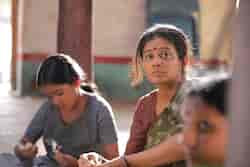Narappa Review - Venkatesh steals the show in a faithful but effective remake of Asuran
Director Sreekanth Addala succeeds in preserving the soul of the original,
Jul 19, 2021

Narappa
A textbook definition of an ideal remake doesn't exist. The very idea of a remake is to recreate the magic of the original - some do it by staying loyal to the source material like a T while others use the opportunity to give it a different spin for a newer target audience. It's not hard to guess the approach Sreekanth Addala takes while remaking a film as successful as Vettrimaaran's Asuran. This is by no means to disrepute his credentials as a filmmaker but to suggest that he has the wisdom to not tinker with the soul of Asuran. Narappa is like a wise student who surrenders to his master sincerely and succeeds.
As a story, Narappa's biggest advantage is that it's a perfect melange of two worlds. It does not miss out on the raw emotions and the cinematic highs of a typical action potboiler and also tells a powerful story of an underdog uprising that underlines the importance of wisdom over impulsive reactions. The backdrop in the remake shifts to a village in Anantapur. Narappa and Sundaramma are farmers, parents to two young men Munikanna, Sinabba and a daughter Bujjamma.
Tragedy strikes the household when one of Narappa's kids is brutally murdered for insulting the village landlord over a land issue. The issue complicates further when another son of Narappa kills the landlord seeking vengeance for his brother's death. The entire family has to flee the village at once and grapple with a tricky situation. Sreekanth Addala, in what's inarguably his toughest challenge as a filmmaker yet, triumphs in getting the emotional arcs of the story right and gives his actors enough freedom and breathing space to help the characters come alive.

The conversations within the Narappa family are a whiff of fresh air - the rebellious sons, the impulsive wife and an innocent daughter complete the world of the family's patriarch (Narappa) who's more or less a muted tiger. There's a lot that Narappa does right as a film, but it's the filmmaking and the treatment that impresses you initially. Sreekanth Addala doesn't overblow the situations with excessive melodrama. He maintains an understated tone, save for the flashback portions packaged like a bunch of well-designed fan-pleasing moments.
Not that it needs saying, but the slick action sequences are a delight to watch in Narappa, even if they're set in Asuran-replay mode. The pre-intermission sequence would've been a roar in the theatres without an iota of doubt. Venkatesh enjoys the license he's given as an action hero, getting messy in the mud while fighting the men, seething with anger, jumping, huffing and puffing with the enthusiasm of a teenager. The flashback portions go slightly overboard in glorifying the animalistic violence though a purposeful climax connects all the dots subtly.
Narappa would've been even more memorable if it wasn't only told as a tale of class divide and also discussed casteism in greater detail. Telugu films have time and again avoided strong political overtones; this is not surprising in the case of Narappa too. However, the fact that a mainstream actor like Venkatesh is the face of a film where the protagonist is an underdog from a marginalised community is an achievement in itself and a step in the right direction.
Venkatesh, at 61, couldn't have chosen a better film than Asuran for a remake where he embraces his greys with dignity and packs a punch in a role that does full justice to the performer and the star in him. The role is a perfect package for the actor to showcase his range, shifting effortlessly from his wild beast avatar to being a doting father to a romantic and a man who keeps his emotions constantly in check. The film is an out-and-out Venkatesh show and is easily his best performance in a film after Guru.
Karthik Rathnam continues his glorious form in an intense act, rightly cast as Munikanna, the aggressive Rayalaseema boy who can't keep a lid on his temper. His raw screen presence and spontaneity ought to be celebrated more. Priyamani struggles with the Rayalaseema slang though her abilities as a performer make up for the mild setbacks. The supporting cast including Rajeev Kanakala, Nasser, Brahmaji and Jhansi complement the lead actors well. The Abhirami-Venkatesh pairing in the flashback looks slightly odd. The lesser-known faces like Vasistha Simha, teenager Rakhi, Deepak Shetty and Racha Ravi make their presence felt.
Composer Mani Sharma's folksy touch to songs like O Narappa, Chalaaki Chinnammi are a treat to the senses and cinematographer Shyam K Naidu ensures the visual aesthetics of the story aren't compromised. It's a shame that a film as technically sound as Narappa can't be savoured in theatres. Narappa remains consistently engaging as a narrative and has its own identity despite being a faithful remake of Asuran.
Share
Where To Watch